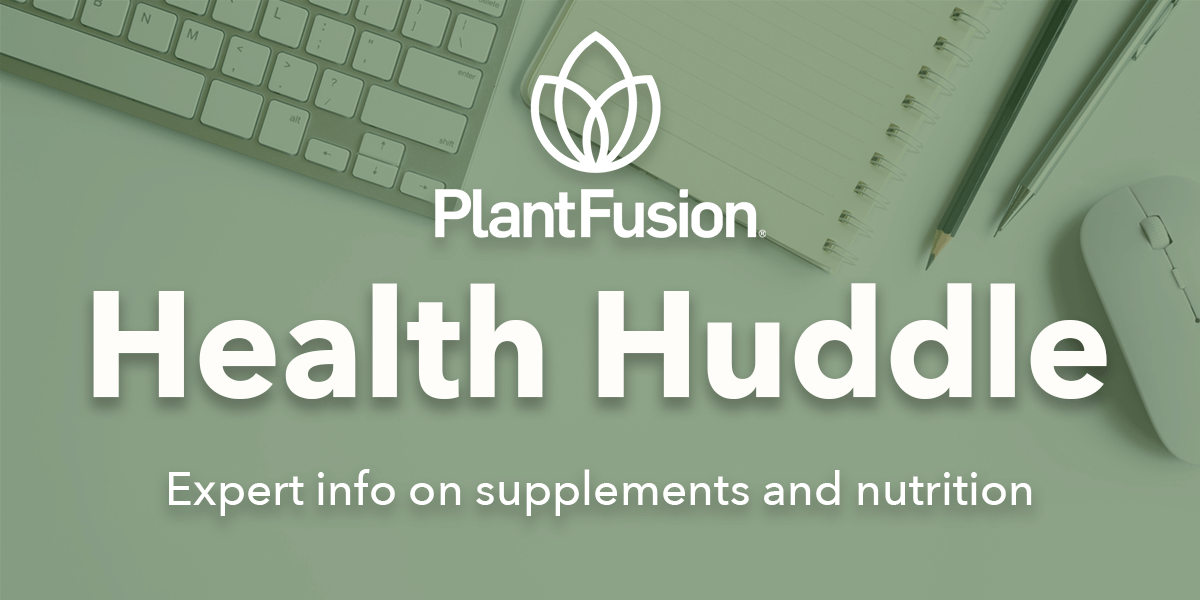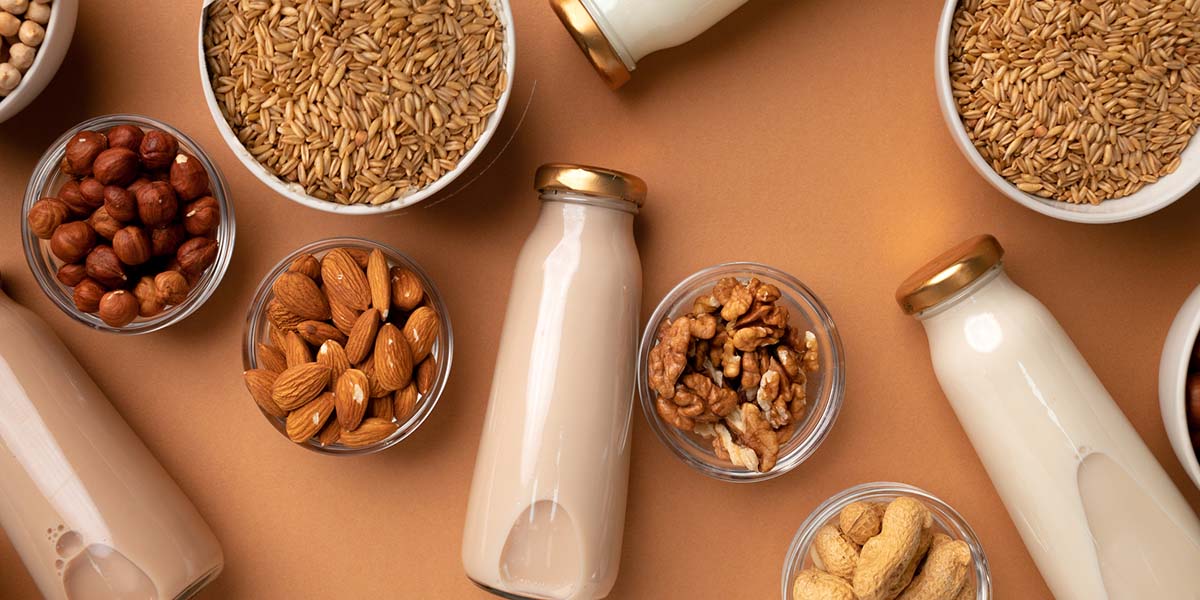This is part of our Ultimate Guide to Plant-Based Protein, a complete overview that will provide helpful information about plant-based protein, the main differences between plant proteins and animal proteins, what complete proteins are and why they are important, and how to get enough protein from plant-based sources.
For years, people wondered if a plant-based diet could provide enough protein on its own. These days most people realize that you can definitely get enough protein from a plant-based diet, as long as you vary the protein sources.
Between vegetarians, vegans, flexitarians, or just people who are doing more plant-based eating, it is clear that opting for non-animal sources of protein continues to grow in popularity. Now the "plant versus animal" debate seems to be around which type of protein is better. Let's take a closer look at the differences between the two protein sources and see if one of them comes out ahead!
What is the Main Difference Between Plant Protein and Animal Protein?
The biggest difference between animal protein and plant protein is that most plant proteins do not contain all nine essential amino acids, while most meat proteins do. (Most plant-based protein sources tend to lack at least 1 of the essential amino acids, although there are some that are considered complete.) However, we do not eat just one nutrient when we consume food.
When we eat foods for protein, we also eat everything that comes with it in that food. For example, certain sources of animal protein can contain high levels of heme iron and vitamin B-12, but also tend to have more calories and higher levels of saturated fats than plant-based proteins do. Plant proteins contain specific nutrients (called phytonutrients), antioxidants, and fiber, however, that animal proteins do not.
Whey Protein vs Plant Protein
A popular way to incorporate more protein into our diet is through the use of protein powders. Adding a scoop of protein powder to a smoothie or drink can provide some extra assurance of getting what your body needs when you're on the go.
For those who are lactose intolerant or have other milk allergies, whey protein can cause gastrointestinal distress, so a plant-based option is usually preferred. But until recently, plant protein was kind of the ugly stepsister of whey – the drinks would be lumpy when mixed, the word "chalky" or "cardboard" would often come up when describing the taste, and the protein sources they were made of weren't very sophisticated. Thankfully, that is no longer the case.
➤CLICK HERE to Check out some of our delicious plant-based protein powders! They provide a fusion of unique ingredients and flavors while delivering a dose of complete, plant-based nourishment.
Milk contains two types of protein- casein and whey. Casein is 80 percent of the milk protein, and whey is the other 20 percent. Athletes have used whey protein supplementation for years to help improve muscle protein synthesis and promote the growth of lean muscle mass. Although whey protein is still a popular choice for many, it's the plant proteins that are projecting the most growth.
The plant-based protein segment is estimated to record the fastest category growth from 2021 to 2028.
Whey protein can have some side effects due to the fact it is an animal product, but most of these side effects are related to lactose intolerance (since lactose is the main carb in whey protein). Plant protein can be extracted from multiple sources, often combining different grains, legumes, nuts, and seeds. Pea and brown rice are commonly included in order to provide the essential amino acids of lysine and methionine, and one study found that brown rice protein is just as effective as whey protein in building muscle, gaining strength, and aiding in recovery.
The plant-based protein powders on the market today also tend to include additional ingredients to provide even more health benefits. Many of them contain essential amino acids, digestive enzymes, pre-and probiotics for gut health, added fiber, antioxidants, or specialty herbs for a targeted benefit (such as supporting hormonal balance).
Amino Acid Profiles – The Difference Between Plant Protein and Animal Protein
All protein is made up of building blocks called amino acids. We do not store amino acids, and there are nine that our bodies cannot make (histidine, isoleucine, leucine, lysine, methionine, phenylalanine, threonine, tryptophan, and valine), so we have a continuous need to get them from our food sources.
As mentioned before, most plant proteins do not contain all 9 essential amino acids (however, you can find a complete amino acid profile in PlantFusion's complete plant-based protein powders). For example, some key plant proteins are often low in tryptophan, lysine, and isoleucine. Animal proteins, on the other hand, tend to have higher amounts of cysteine, homocysteine, and taurine.
Which One is Better - Plant Protein or Animal Protein?
Pound-for-pound, plant-based proteins will pack more nutrients into fewer calories. They also have fiber, which animal proteins do not. Fiber aids in digestion, helps maintain a healthy gut microbiome, and is strongly associated with lower cardiovascular disease risk.
On the flip side, grilled meats are known to have some carcinogenic compounds, and red meat has been associated with colorectal, pancreatic, and prostate cancers. This data suggests that high meat (and especially red meat) intake increases the risk of these cancers.
Both animal proteins and plant proteins can contain fat, but animal proteins contain more fat than plant proteins, and it is of a different type. Meats (think burgers, steaks, bacon, etc.) contain saturated fat – contributing to a juicy meal, perhaps, but also to potential health issues. Plant foods such as nuts and avocados also have fats, but they are what we call "healthy fats"- the kinds that are good for your heart!
Benefits of Plant Protein Over Animal Protein
The main benefits of plant proteins over animal proteins are increased gut health, more vitamins and minerals, and the inclusion of fiber, but there is also a lower risk of diseases associated with eating plant-based.
Studies show that a vegetarian or vegan diet likely leads to weight loss when consumed regularly, helping to minimize many of the health issues related to obesity. Other studies show that vegetarian and vegan diets have a lower risk for type-2 diabetes, cancer, and heart disease.
There is also a bank of supportive research supporting a plant-rich diet to reduce the risk of cognitive impairment, Alzheimer's, and dementia. Data also suggests that the risk of stroke may be reduced by replacing red meat with plant-based sources of protein.
Finally, plant-based foods are high in antioxidants, which have been shown to help in the prevention and treatment of chronic diseases and in supporting the immune system.
Replacing Animal Protein with Plant Protein
Replacing animal protein with plant-based protein lowers the risk of death from cancer and heart disease, according to a study published online in JAMA Internal Medicine. The study showed that consuming just 3% less animal protein and replacing it with plant protein was associated with up to a 19% lower risk of death from any cause.
Additionally, researchers from St. Michael’s Hospital in Toronto reviewed and analyzed 112 randomized studies that involved subjects who replaced animal proteins (meat, poultry, fish/seafood, and dairy products) with plant proteins (soy, nuts, dried peas and beans, lentils, and chickpeas) for at least three weeks. They found that eating just one or two servings of plant-based proteins instead of animal-based proteins a day can produce positive health benefits.
All of this research is impactful because it takes the pressure off of anybody needing to switch to a completely plant-based diet in order to be healthier. It's also super easy to make simple protein changes in your favorite meals:
Take tacos, pasta with meat sauce, or shepherd's pie,for example –Instead of ground beef or turkey, swap in some vegan protein crumbles. There are several brands available in the produce or frozen foods sections of almost any major grocery store. They are usually made from soy, mycoprotein, pea protein, lentils, or a combination of plant-based sources.
Ditch the chicken in favor of some vegan "chick'n" strips in your next stir fry, quesadilla, or caesar wrap.
Upcoming summer barbeques (and we are ALL looking forward to getting out to one of those this year, right?!) can easily be enjoyed with veggie burgers and sausages – there are even options for vegan ice cream to help keep things cool with a make-your-own sundae bar!
And the plant-based options don't have to all be pre-prepared products. Diced mushrooms, lentils, beans, eggplant, and potatoes can all jump into a number of recipes to provide a satisfying portion of non-animal protein.
Replacing animal proteins with plant proteins doesn't have to be an all-or-nothing change. Just making an effort to eat more plant-based foods and focusing on overall nutrition will provide ample health benefits and reduced health risks.
Summary
Switching out animal protein for plant-based protein can be beneficial for health, whether done in part or completely. Research has clearly shown how the inclusion of plant-based foods in the diet can lower the risk of so many illnesses, it makes sense for us to try more plant protein sources. Now we have smooth, great-tasting protein powders to provide convenient, on-the-go protein options. There are also plenty of ready-to-use meat alternatives that can be easily incorporated into our favorite recipes. And there are barbeques on the horizon, at a time when a vegetarian and an omnivore can both enjoy a great-tasting, juicy burger with a slice of watermelon or an ear of corn.















